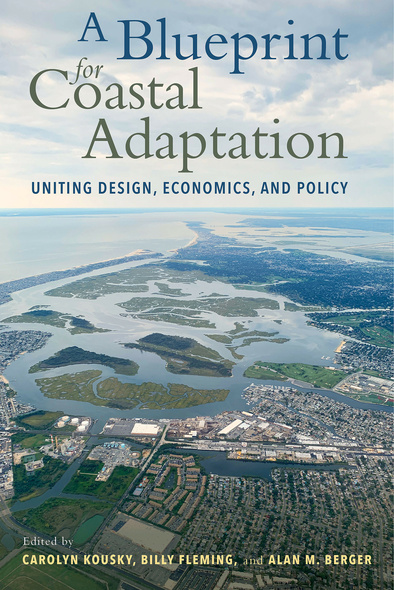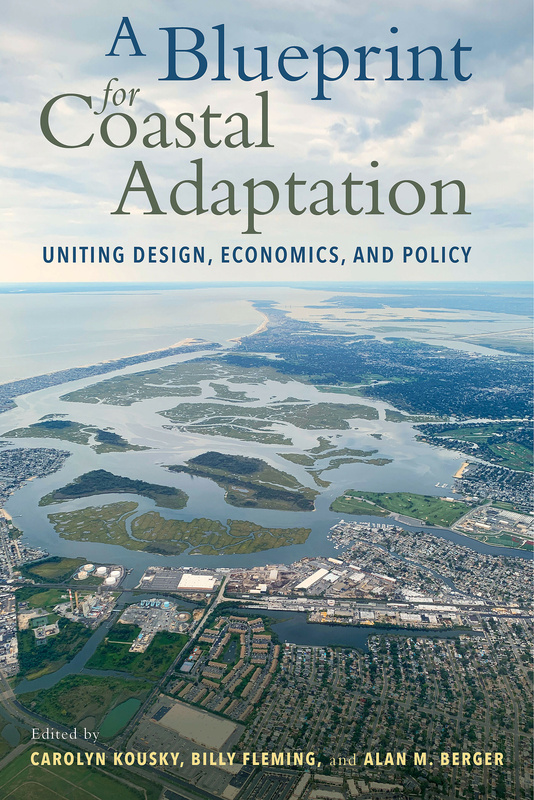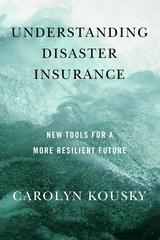A Blueprint for Coastal Adaptation
Uniting Design, Economics, and Policy
Island Press
Tens of millions of Americans are at risk from sea level rise, increased tidal flooding, and intensifying storms. The design and policy decisions that have shaped coastal areas are in desperate need of updates to help communities better adapt to a changing climate. A Blueprint for Coastal Adaptation identifies a bold new research and policy agenda and provides implementable options for coastal communities.
In this book, coastal adaptation experts discuss the interrelated challenges facing communities experiencing sea level rise and increasing storm impacts. These issues extend far beyond land use planning into housing policy, financing for public infrastructure, insurance, fostering healthier coastal ecosystems, and more. Deftly addressing far-reaching problems from cleaning up contaminated, abandoned sites, to changes in drinking water composition, chapters give a clear-eyed view of how we might yet chart a course for thriving coastal communities. They offer a range of climate adaptation policies that could protect coastal communities against increasing risk, while preserving the economic value of these locations, their natural environments, and their community and cultural values. Lessons are drawn from coastal communities around the United States to present equitable solutions. The book provides tools for evaluating necessary tradeoffs to think more comprehensively about the future of our coastal communities.
Coastal adaptation will not be easy, but planning for it is critical to the survival of many communities. A Blueprint for Coastal Adaptation will inspire innovative and cross-disciplinary thinking about coastal policy at the state and local level while providing actionable, realistic policy and planning options for adaptation professionals and policymakers.
In this book, coastal adaptation experts discuss the interrelated challenges facing communities experiencing sea level rise and increasing storm impacts. These issues extend far beyond land use planning into housing policy, financing for public infrastructure, insurance, fostering healthier coastal ecosystems, and more. Deftly addressing far-reaching problems from cleaning up contaminated, abandoned sites, to changes in drinking water composition, chapters give a clear-eyed view of how we might yet chart a course for thriving coastal communities. They offer a range of climate adaptation policies that could protect coastal communities against increasing risk, while preserving the economic value of these locations, their natural environments, and their community and cultural values. Lessons are drawn from coastal communities around the United States to present equitable solutions. The book provides tools for evaluating necessary tradeoffs to think more comprehensively about the future of our coastal communities.
Coastal adaptation will not be easy, but planning for it is critical to the survival of many communities. A Blueprint for Coastal Adaptation will inspire innovative and cross-disciplinary thinking about coastal policy at the state and local level while providing actionable, realistic policy and planning options for adaptation professionals and policymakers.
Everyone should read this book to see how the field of landscape architecture might help cities adapt to a changing climate, particularly with new federally-funded infrastructure investments. Each chapter of this book reaches beyond the conventional limits of our professional knowledge, by degrees or by leaps. But the most important bar this anthology has set for other books about adaptation is to place questions about funding and policy side-by-side with design proposals.
The publication aims to mitigate the inequities that are amplified in global emergency scenarios. It offers insight into how to navigate the institutions and entities involved in coastal adaptation, while providing an alternative design strategy for infrastructural, landscape and urban adaptation. It acknowledges the world of landscape adaptation as a collaborative endeavor, and insight into the scope for action and the thinking required to transform vulnerable coastline areas.
Coastal vulnerability and adaptation are so, so complex, and are often treated in narrow, economistic ways that underplay the roles of politics, culture, infrastructure, and resistance by private interests. I’m excited to see this partnership of design schools with business schools and their taking up of such a range of issues. This is a breakthrough volume.
This collection provides a range of ideas and stories grounded in present systems and structures. It identifies challenges and recommendations that will help support early transitions in the next phase of coastal adaptation planning, policy, and practice.
Carolyn Kousky is Executive Director of the Wharton Risk Management and Decision Processes Center at the University of Pennsylvania.
Billy Fleming is the Wilks Family Director for The Ian L. McHarg Center at PennDesign.
Alan Berger is Professor of Landscape Architecture and Urban Design at Massachusetts Institute of Technology.
Billy Fleming is the Wilks Family Director for The Ian L. McHarg Center at PennDesign.
Alan Berger is Professor of Landscape Architecture and Urban Design at Massachusetts Institute of Technology.
Foreword \ Jeff Goodell
Introduction: The Changing Risks of Coastal Communities \ Carolyn Kousky, Billy Fleming, and Alan M. Berger
Part I: Designing for Equitable Resilience
Chapter 1. A Comprehensive Framework for Coastal Flood-Risk Reduction: Charting a Course Toward Resiliency \ Samuel Brody, Kayode Atoba, Wesley Highfield, Antonia Sebastian, Russell Blessing, William Mobley, and Laura Stearns
Chapter 2. Designing for Resilience in Rich Coastal Cities (and Beyond) \ Matthijs Bouw
Chapter 3. For Whom Do We Account in Climate Adaptation? \ Karen M'Closkey and Keith VanDerSys
Chapter 4. Preparation, Adaptation, and Retreat in Miami Beach and Buras \ Joyce Coffee and Sarah Dobie
Chapter 5. Head of Bay Coastal Resilience: Adaptive Design for Jamaica Bay, New York \ Catherine Seavitt Nordenson, Rennie Jones, Paul Lewis, and Guy Nordenson
Part II: Adapting Public Policy and Finance
Chapter 6. Public Funding of Coastal Adaptation: A Review of US Public Sources—and the Case for More \ Carlos Martín
Chapter 7. Insurance and Coastal Adaptation \ Carolyn Kousky
Chapter 8. Environmental Impact Bonds: An Innovation in Financing Climate Adaptation \ Shannon Cunniff, Benjamin Cohen, and Carolyn duPont
Chapter 9. Adapting Coastal Drinking Water to Rising Seas \ Allison Lassiter
Chapter 10. Take Out the Trash When You Leave: Cleaning Up Properties Abandoned to Rising Seas \ Thomas Ruppert
Chapter 11. Flux Zoning: From End-State Planning to Zoning for Uncertainty \ Fadi Masoud and David Vega-Barachowitz
Chapter 12. Coastal Urbanism: Designing the Future Waterfront \ Rafi Segal and Susannah Drake
Contributors
Index
Introduction: The Changing Risks of Coastal Communities \ Carolyn Kousky, Billy Fleming, and Alan M. Berger
Part I: Designing for Equitable Resilience
Chapter 1. A Comprehensive Framework for Coastal Flood-Risk Reduction: Charting a Course Toward Resiliency \ Samuel Brody, Kayode Atoba, Wesley Highfield, Antonia Sebastian, Russell Blessing, William Mobley, and Laura Stearns
Chapter 2. Designing for Resilience in Rich Coastal Cities (and Beyond) \ Matthijs Bouw
Chapter 3. For Whom Do We Account in Climate Adaptation? \ Karen M'Closkey and Keith VanDerSys
Chapter 4. Preparation, Adaptation, and Retreat in Miami Beach and Buras \ Joyce Coffee and Sarah Dobie
Chapter 5. Head of Bay Coastal Resilience: Adaptive Design for Jamaica Bay, New York \ Catherine Seavitt Nordenson, Rennie Jones, Paul Lewis, and Guy Nordenson
Part II: Adapting Public Policy and Finance
Chapter 6. Public Funding of Coastal Adaptation: A Review of US Public Sources—and the Case for More \ Carlos Martín
Chapter 7. Insurance and Coastal Adaptation \ Carolyn Kousky
Chapter 8. Environmental Impact Bonds: An Innovation in Financing Climate Adaptation \ Shannon Cunniff, Benjamin Cohen, and Carolyn duPont
Chapter 9. Adapting Coastal Drinking Water to Rising Seas \ Allison Lassiter
Chapter 10. Take Out the Trash When You Leave: Cleaning Up Properties Abandoned to Rising Seas \ Thomas Ruppert
Chapter 11. Flux Zoning: From End-State Planning to Zoning for Uncertainty \ Fadi Masoud and David Vega-Barachowitz
Chapter 12. Coastal Urbanism: Designing the Future Waterfront \ Rafi Segal and Susannah Drake
Contributors
Index








